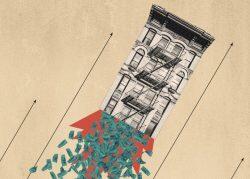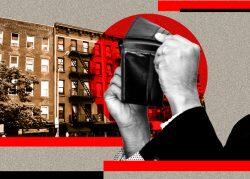 Rent board staff proposes increase of up to 4.5%
Rent board staff proposes increase of up to 4.5%
Trending
Rent Guidelines Board considers moderate hike in narrow vote
Landlord groups say proposed 2% to 4% bump on one-year leases doesn’t go far enough

The rental pendulum, it appears, has begun to swing back toward landlords. But they say it hasn’t moved far enough.
In a preliminary vote Thursday night, the Rent Guidelines Board narrowly approved a proposal by Chair David Reiss to hike rents on stabilized apartments by 2 to 4 percent for one-year leases and 4 to 6 percent for two-year leases. The motion passed five to four.
If implemented, the hikes on rent-stabilized units would be the first full-year increases since the start of the pandemic. The preliminary vote typically sets the upper and lower boundaries for potential increases the board will consider in June. A separate proposal introduced by tenant representative Sheila Garcia called for a rent freeze on stabilized hotels, which the board approved by a seven to two vote.
After years of tenant-friendly outcomes, including multiple rent freezes during the de Blasio administration, landlords have said they are overdue for a bump. Those calls intensified when a March rent board report showed owners’ net operating income had plunged nearly 8 percent in 2020, the steepest decline in 17 years.
“[The rent board] took the tenant side into consideration for a large number of years,” said Vito Signorile, vice president of communications for the RSA. “Now we have data showing that might have impacted the condition of the housing stock and it’s time to move forward a little bit.”
But the hike the board approved still falls short of what owners say they need to keep housing in good shape and offset inflation.
Owner representatives Robert Ehrlich and Christina Smyth asked for increases of 4.5 to 6.5 percent on one-year leases and 6.5 to 8.5 percent on two-year terms, largely in line with proposals the RSA released last week. That motion failed two to seven.
Landlords argue that since the 2019 rent law passed, their only recourse for boosting revenue is through the rent board’s annual increases. Multi-year freezes, they argue, have left some owners without the necessary cash to finance repairs amid rising costs.
The Community Housing Improvement Program, a landlord group which recently launched a campaign to highlight the 20,000 stabilized units that it claims stand vacant because owners can’t afford upgrades, said the impact of the law has left stabilized housing stock on the brink of “collapse.”
“For the past eight years, the average annual rent increase has been less than 1 percent a year, while operating costs during the same period have increased nearly fivefold,” said Joseph Strasburg, president of the RSA.
“These preliminary ranges have proven our biggest fear — that the RGB continues to believe its duty is to operate solely as an affordability program for tenants,” he added.
Tenant members threw the inverse argument at landlords, highlighting that the drop in landlords’ profits was just the fourth decline they’ve experienced in 26 years.
“If we’re voting on rent increases because [net operating income] fell, when [net operating income] was rising why didn’t we roll back the rents and make sure tenants could afford their apartments?” Garcia asked during testimony.
Garcia, who delivered her testimony seated alongside tenants holding signs, added that many renters are still recovering from the financial impact of the pandemic and can’t shoulder even a minimal rent increase.
A white paper released Wednesday by The Met Council on Housing, a tenants’ rights group, suggested the average renters’ income has declined since the pandemic began. The report also estimated that tenants’ arrears have nearly doubled from $2.2 billion in the summer of 2020 to $4 billion now.
To offset those burdens, tenant members called for changes to fall between a 1 percent rollback and a 1 percent hike on one-year leases and between a rent freeze and a 1.5 percent increase for two-year leases, a motion that ultimately failed.
Moments before the board approved the preliminary hike, Garcia took a moment to broadcast the concerns voiced by the tenants in her room.
“People are suggesting that maybe when they get evicted they can come and live with some of the board members who are proposing these increases,” Garcia said. “Because that 2 percent [increase] at the minimum would be devastating to most of the folks in this room.”
Read more
 Rent board staff proposes increase of up to 4.5%
Rent board staff proposes increase of up to 4.5%
 Landlords’ profits drop nearly 8%, most in 17 years: rent board
Landlords’ profits drop nearly 8%, most in 17 years: rent board




